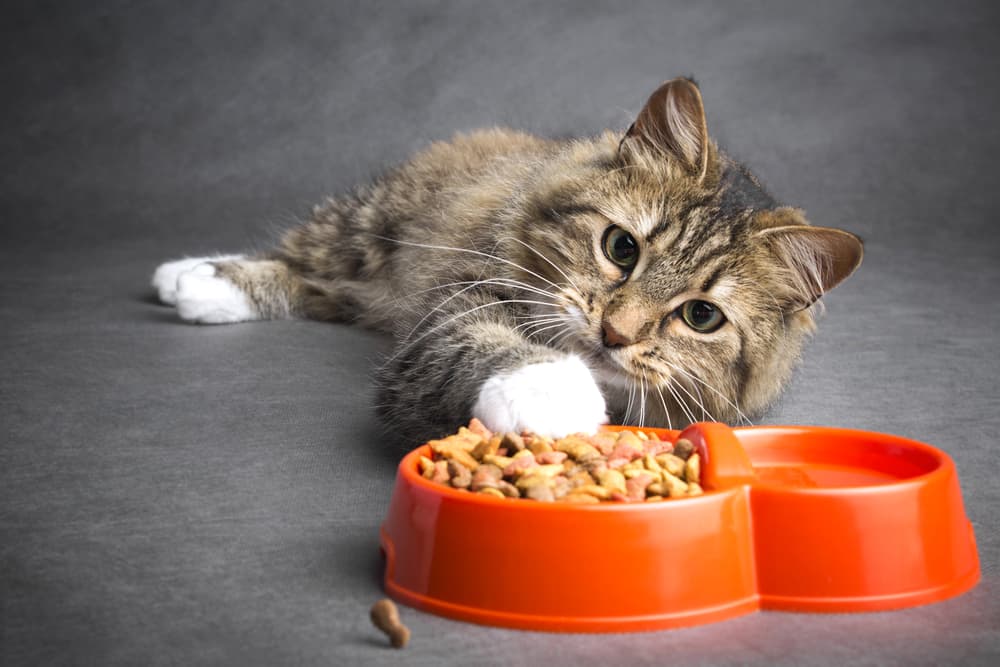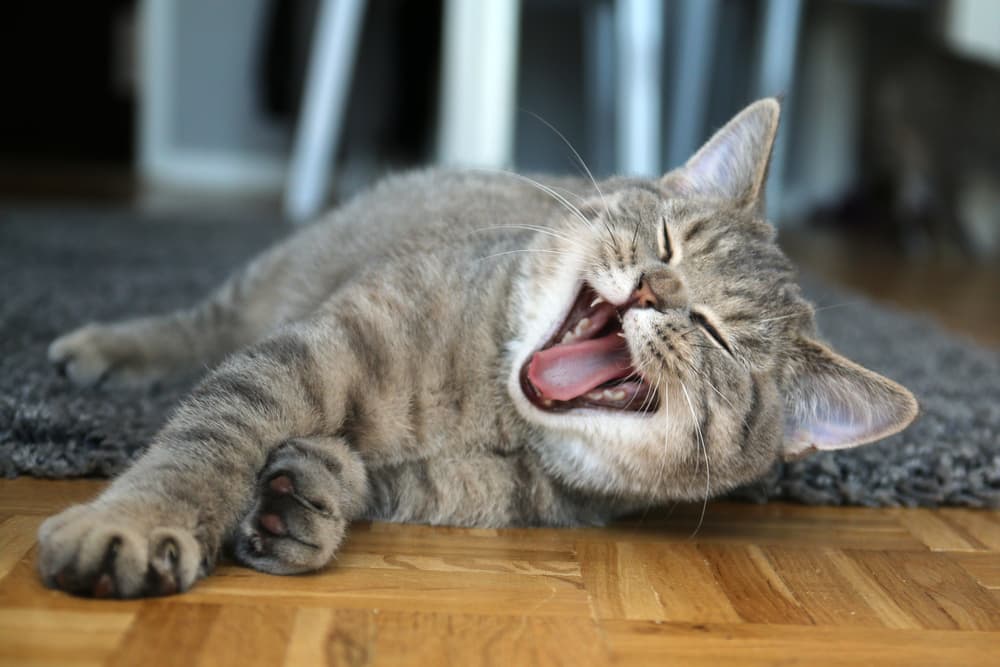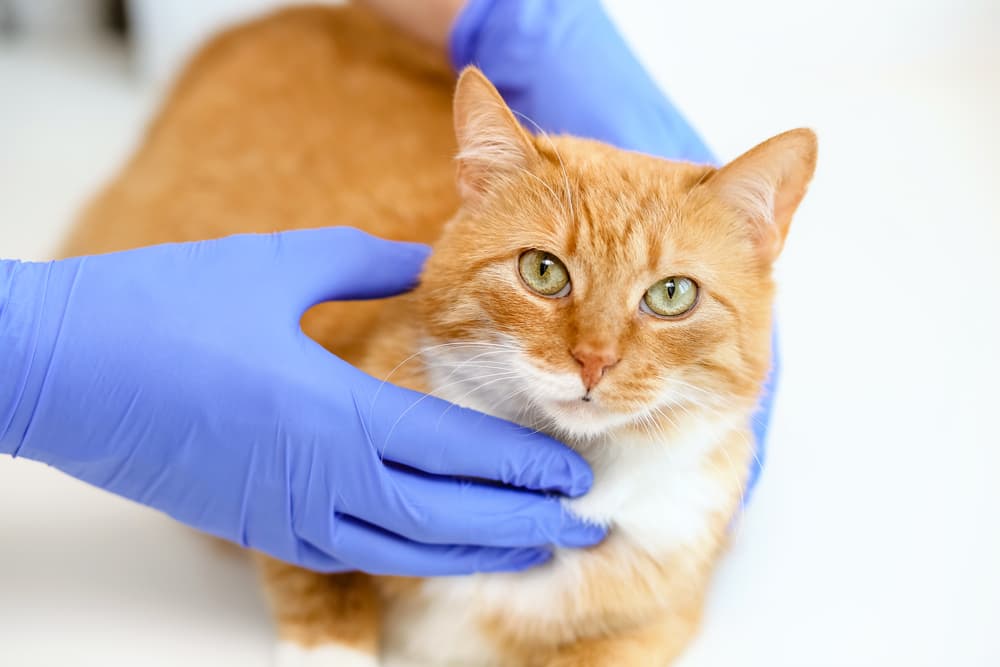Why Is My Cat Throwing Up Food?

If you have cats, you’ve likely seen them vomit at some point in their life. Some cats vomit so often that their people think of it as “normal.” But that’s far from the truth. While not every vomiting episode needs an emergency trip to the vet, vomiting in cats is never normal.
This article covers why cats throw up, the difference between vomiting and regurgitation, how to interpret vomit, and when it signals a serious health issue.
Why Do Cats Throw Up Food?

Vomiting isn’t a specific disease or diagnosis. It’s a non-specific symptom caused by many things. Occasional vomiting (once a month or less) is usually not a sign of concern, especially if it includes hair. But vomiting more often indicates something is awry. At that point, your cat needs some sort of investigation and intervention.
Cat Vomiting vs. Regurgitation

If your cat brings up food, it may not be vomiting. That’s why it’s important to know the difference between vomiting and regurgitation.
Vomiting can happen at any time. It’s an active, strenuous activity often preceded by retching. Cats feel nauseous, may drool or vocalize and often won’t want to eat.
Regurgitation signals a problem with the esophagus, the part of a cat’s digestive system connecting the mouth to the stomach. Regurgitation is a passive process, the cat burps and undigested food comes out. It usually happens soon after eating, and the cat may regurgitate and then try to eat again. There is no nausea.
Why Do Cats Throw Up Undigested Food?

Is your cat throwing up food but acting normal? The most common cause for cats to vomit undigested food is gorging. When cats gorge, they overextend their stomach, which triggers the cat to vomit.
Eating grass can also cause vomiting. While we don’t know exactly why cats eat grass, we know that the shape and texture of it may irritate their gag reflex.
If your cat is vomiting due to gorging or eating grass, it is not a medical emergency. But there are other reasons why a cat will throw up after eating that need veterinary attention. These include:
Intestinal obstruction
Foreign objects that can lacerate or create a blockage in the gut, including small toys, bones, large hairballs, hair ties, ribbon or tinsel, can all cause vomiting.
Allergies or adverse food reactions
Cats can have allergies to ingredients in their food that can cause chronic vomiting. The most common allergens are poultry, beef, pork, eggs, soy, turkey and lamb. Cats with food allergies usually have diarrhea and itchy skin as well. Adverse food reactions stem from issues like food poisoning, additives, lactose intolerance (cats can’t digest milk), or unsuitable human food.
Gut inflammation
Cats can vomit and have diarrhea from inflammatory bowel disease (IBD). Chronic untreated IBD has been associated with a specific stomach cancer in cats called lymphosarcoma. Bacterial overgrowth in the gut can also cause vomiting and diarrhea.
Intestinal parasites or viruses
Parasites, like hookworms and roundworms, can cause vomiting and diarrhea in cats. Cats with worms can also have a potbellied appearance. Cats with panleukopenia, feline leukemia or other viruses can also vomit.
Problems elsewhere
Diseases that cause nausea, such as chronic kidney disease, liver disease, pancreatitis, neurological disease, hyperthyroidism, inner ear problems, and diabetes can all cause vomiting.
Poisoning
Chewing on toxic plants or ingesting antifreeze, pesticides, herbicides, or human prescription drugs can all cause vomiting. Some cats can also vomit in response to medications prescribed to them.
Stress
Moving, visitors, changes in routine and adding new pets to the household can all cause stress in cats, which can cause vomiting.
Cat Vomiting Food: When to Worry

If your cat experiences frequent vomiting, consult with a veterinarian at your earliest convenience. Vomiting is never normal, but there are some specific symptoms that signal a potential emergency:
- Acute vomiting
- An uptick in chronic vomiting
- Problems with eating or drinking
- Weight loss
- Acting tired or weak
- Straining to urinate or defecate in the litterbox, or inappropriate elimination elsewhere in the house
- Increased aggression
- Hiding more
- Drooling
- Fever
- Diarrhea
- Yellowed skin or whites of eyes (jaundice)
- Fresh red blood in vomit or material that looks like coffee grounds
- Vomiting in conjunction with medication administration
- Worms in your cat’s stool in addition to vomiting
- Your cat has already been diagnosed with a disease like diabetes or kidney disease.
- You see evidence that your cat consumed something dangerous, such as chewed up hair ties, ribbon, tinsel, poisonous plants or other poisonous substances
- Your cat is very young or very old.
Chronic vomiting can lead to more rapid dehydration and weight loss in older cats. Cats of any age (and especially seniors) should receive regular physical exams, bloodwork, and urinalysis to rule out any emerging disorders that could affect your cat’s health and quality of life.
Treatment Options for Cats Throwing up Food

Your vet will examine your cat, discuss their symptoms, and may recommend tests like bloodwork, urinalysis, parasite checks, or imaging (ultrasound or X-rays).
Bring a sample of the vomit, a stool sample, and anything else out of the ordinary you think your cat may have consumed to the appointment. Also, know the brand and type of food you feed your cat and how much and how fast your cat eats.
Treatment will depend on the cause of vomiting and may include:
- Medication to reduce nausea
- Deworming for parasites
- Treatment for diseases outside the stomach that can cause nausea
- Detoxification of poisonous substances
- Surgery to remove an obstruction
- Diet changes for food allergies or hairballs
- Medication such as steroids to reduce inflammation in the gut
Usually after mild, acute vomiting, nausea medication and a bland diet for a couple of days will do the trick.
Pet parents often wonder if there are any home remedies for cat vomiting. Unless your cat is vomiting due to gorging food, there are no home remedies for cat vomiting. Don’t give a cat human medication for vomiting unless directed by a veterinarian. Also, never let a cat go more than a day or two without eating.
How to Prevent Cats Throwing Up Food

If you’re concerned about your cat developing a problem with vomiting, follow these steps to reduce its likelihood:
Slow your cat’s eating by using a food puzzle. If your cat gorges on their food, consider a puzzle feeder or an automatic feeder that feeds them throughout the day. Or, you can feed your cat several smaller meals throughout the day or spread the food out on a flat surface.
Switch your cat’s food. Consider changing your cat’s diet to a food formulated for sensitive stomachs. If your cat vomits food and hair, brush your cat more often and consider switching to a hairball food.
Minimize stress in your cat’s environment. Stress can cause vomiting. Keep your cat calm at home by providing enough litter boxes, water bowls and food. Also, offer plenty of scratching and climbing opportunities.
Bring your cat in for regular veterinary care. Have your cat checked out yearly by your veterinarian, and speak with them more often if you have concerns about your cat’s habits.









